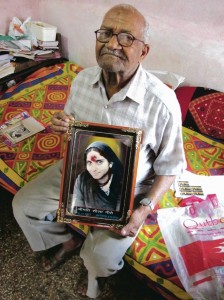The Social Injustices of Clinical Drug Trials in the Global South

been part of a clinical trial in Khandwa, India.
Photo credit: washingtonpost.com
Capitalism: a word that describes a society where an alarming number of things can be bought and sold. Land, air, resources, people’s thoughts and ideas—all are liable for exploitation and depletion in service of an expanding market. The human body has also become a site of market expansion and profit generation. Countries such as China and India are known for their large and striking “resource pool” of labour which commodifies and dehumanizes people. India has become an especially attractive site for large pharmaceutical companies to carry out drug trials at a low economic and high social cost, resulting in death, uninformed consent, and disablement for trial participants.
Clinical drug trials are targeting participants who are associated with social differences—the intersection of race, caste, class, gender, sexuality, and ability constructions—which render them vulnerable to exploitation. In India, the media has focused on people of lower castes and classes who are targeted by doctors and major pharmaceutical companies. However, few scholars have delved deeper into the issue of how to understand how people associated with social differences are being targeted to participate in drug trials in India. Such groups are more inclined to accept greater risks at a lower price because of their associations with social differences and lower hierarchal positions in society.
Major pharmaceutical companies such as Theravance Inc., Wyeth Research (now part of Pfizer), Sanofi-Synthelabo (now Sanofi-Aventis), AstraZeneca, Schering, and GlaxoSmithKline choose to outsource their drug trials to countries of the Global South, like India, because of decreased costs and increased opportunities to exploit citizens of those countries. Pharmaceutical companies recognize their power over Indian people associated with social differences, but also, and more importantly, the power of their foreign direct investments over the Indian government. This power imbalance serves the interests of corporations, where profit reigns supreme. As a result, few, if any, social repercussions are addressed.
However, corporations are only part of the problem; many medical professionals are given substantial monetary incentives to recruit their own patients into trials. Subsequently, this process creates a large conflict of interest threatening the well-being of patients, who commonly enter drug trials with uninformed consent. As previously alluded to, the government is also a major contributor to the persistence of this social injustice. The Indian government has not been inclined to impose and enforce stricter regulations or limitations on pharmaceutical companies because of the economic benefits associated with creating an attractive environment for foreign direct investments. Like doctors and pharmaceutical companies, governments are not immune to capitalist influences, which privilege profit over social cost.
The literature and media involving the drug trials in India has been limited to describing negative repercussions of the targeting certain of class/caste constructs and the shocking results of death. For example, the BBC produced a documentary outlining the immense consent issues plaguing these trials. In the reporting, it was found that doctors were lowering the bar for consent to drug trials to merely fingerprints. People were dying with no idea of their involvement in drug trials, as consent was commonly communicated in a language they did not understand. While these facts are important to consider, a wider scope of information must be reported and analyzed. The possible intersection of other social differences such as ability, gender, and sexuality are not being addressed in reports such as the BBC documentary. Furthermore, reporting deaths is an effective method of grasping public awareness, but the issue of disability should figure much more prominently than it has. The disability of a primary breadwinner as a result of drug trial participation, for example, has a different, yet just as profound impact on a family and deserves the same level of awareness. This aspect of the social injustice of drug trials needs to be reported by more media outlets. The capitalist approach taken to drug trials serves to reproduce social differences and oppression of Indian people.
Finally, the social injustices of drug trials are not only restricted to India and the Global South. Corporations and doctors have also targeted people in the Global North. This global social injustice reflects a capitalist mentality which treats people not as people, but as commodified flesh.
